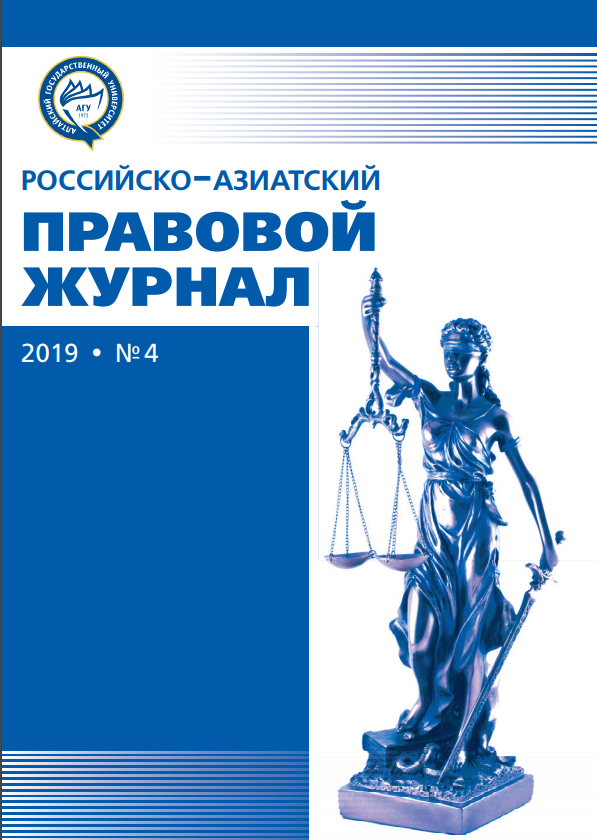LEGAL SYMBOL AND LEGAL FICTION: PROBLEMS OF DEMARCATION
УДК 340.111.57 ББК 67.400.5
Abstract
The article considers the legal symbol and legal fiction as special legal categories. The correctness of anarrow approach to their essence was established according to which the notion of «legal fiction» does notinclude fictitious phenomena, and the notion of «legal symbol» does not cover symbols prohibited by law,and symbols which represent certain values. It was revealed that both considered categories have a certaindegree of conventionality, in a specific way according to the scheme established by the legislator, thereforethey are sometimes mixed in the literature. Legal symbols, unlike legal fictions, are more fundamental, buthave an auxiliary character, since they reflect an existing legal precept, and are not part of a new legal norm,contain an encrypted meaning, but do not distort the legal reality.Legal symbols and legal fictions play a very important role in legal regulation, since they optimize it andmake it more quality, and also provide legal and linguistic economy.
Downloads
References
1997. 533 с.
2. Давыдова М.Л. Юридическая техника: проблемы теории и методологии : монография. Волгоград, 2009. 318 с.
3. Никитин А.В. Правовой символ как прием юридической техники // Проблемы юридической
техники / под ред. В.М. Баранова. Нижний Новгород, 2000. 823 с.
4. Леоненко Н.Т. Законодательная техника : учебное пособие. Новосибирск, 2015. 276 с.
5. Филимонова И.В. Юридический символ и юридическая фикция: общее и различное // Понимание государства и права, подходы и проблемы : материалы Международной научно-практической
конференции. Пятигорск, 2013. С. 168–174.
6. Никитин А.В. Правовые символы : дис. … канд. юрид. наук. Нижний Новгород, 1999. 241 с.
7. О Государственном флаге Российской Федерации : Федеральный конституционный закон
от 25.12.2000 N 1-ФКЗ: принят ГД ФС РФ 08.12.2000 // Российская газета. 2000. №244.
8. О Государственном гербе Российской Федерации : Федеральный конституционный закон
от 25.12.2000 N 2-ФКЗ: принят ГД ФС РФ 08.12.2000 // Российская газета. 2000. №244.
9. Вопленко Н.Н. Правовая символика // Правоведение. 1995. №4–5. С. 71–73.
10. Зацепина О.Е. К вопросу о сущности правовой фикции // Пролог: журнал о праве. 2017. №2.
С. 7–13.
11. Теория государства и права : учебник / под ред. В.К. Бабаева. М., 2013. 592 с.
12. Семейный кодекс Российской Федерации : Федеральный закон от 29.12.1995. №223-ФЗ: принят ГД ФС РФ 08.12.1995 // Российская газета. 1996. №17.
13. Марохин Е.Ю. Юридическая фикция в современном российском законодательстве : дис. …
канд. юрид. наук. Ставрополь, 2004. 179 с.
14. Танимов О.В. Теория юридических фикций : монография / отв. ред. Т.В. Кашанина. М., 2016.
225 с.
15. Ишигилов И.Л. Понятие юридических фикций // Сибирский юридический вестник. 2007.
№1 (36). С. 3–7.
16. Филимонова И.В. Проблема определения признаков юридической фикции // Политика, государство и право. 2014. №10 (34). С. 45–51.
17. Лотфуллин Р.К. Юридические фикции в гражданском праве : автореф. дис. … канд. юрид.
наук. М., 2008. 27 с.
18. Словари и энциклопедии на Академике. URL: dic.academic.ru.
19. Об электронной подписи : Федеральный закон от 06.04.2011 №63-ФЗ: принят ГД ФС РФ
25.03.2011 // Российская газета. 2011. №75.
Russian-Asian Law Journal is a golden publisher, as we allow self-archiving, but most importantly we are fully transparent about your rights.
Authors may present and discuss their findings ahead of publication: at scientific conferences, on preprint servers, in public databases, and in blogs, wikis, tweets, and other informal communication channels.
Russian-Asian Law Journal allows authors to deposit manuscripts (currently under review or those for intended submission) in non-commercial, pre-print servers such as ArXiv.
Authors who publish with this journal agree to the following terms:
- Authors retain copyright and grant the journal right of first publication with the work simultaneously licensed under a Creative Commons Attribution License that allows others to share the work with an acknowledgement of the work's authorship and initial publication in this journal.
- Authors are able to enter into separate, additional contractual arrangements for the non-exclusive distribution of the journal's published version of the work (e.g., post it to an institutional repository or publish it in a book), with an acknowledgement of its initial publication in this journal.
- Authors are permitted and encouraged to post their work online (e.g., in institutional repositories or on their website) prior to and during the submission process, as it can lead to productive exchanges, as well as earlier and greater citation of published work (See The Effect of Open Access).








